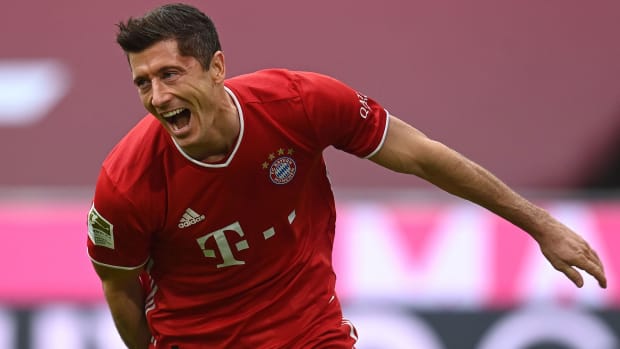If not for an Icelandic volcano, the world's preeminent striker would have been drastically re-routed. It's safe to say it all worked out.
History is very rarely the story of careful plans that go right. External events, unpredictable and random, are always there to send things off course. What if the White Ship hadn’t sunk in 1120, killing the heir to Henry I; was England doomed anyway to civil war and the Anarchy? What if Archduke Franz Ferdinand had taken a different route through Sarajevo that day in 1914 and not been assassinated; was the First World War inevitable?
What if the Icelandic volcano Eyjafjallajokull had not erupted in 2010? It’s perhaps the greatest counter-factual in modern European football history. Pep Guardiola’s Barcelona would have been able to fly to Milan for its Champions League semifinal first leg, rather than taking the bus. Fresher, perhaps it wouldn’t have lost, 3-1, to Jose Mourinho’s Inter Milan, and so wouldn’t have been eliminated by an epic rearguard in the second leg. That would have allowed Guardiola to go on to defeat his former coach, Louis van Gaal, and Bayern Munich in the final, the second leg of a possible hat trick. And perhaps the seed from which all of Guardiola’s doubts in subsequent Champions League knockout ties has grown would not have taken root, and a decade on we would now be looking back at a landscape he had utterly dominated.
But that’s a hypothetical.

What we know for sure is that, but for the Icelandic ash cloud, a promising, 21-year-old Lech Poznan striker would have flown to the UK to sign for Sam Allardyce’s Blackburn Rovers. Instead, Borussia Dortmund pounced and signed Robert Lewandowski. Six months later, Indian chicken giant Venky’s took over Blackburn, Allardyce quit after the new owners tried to impose a series of signings on him and the club fell into decline. That same season, Lewandowski’s goals inspired Jurgen Klopp’s Borussia Dortmund to the Bundesliga title.
A decade later, Lewandowski is a European champion with Bayern Munich and widely regarded as the best striker in the world, while Blackburn lies 11th in England's second-tier Championship. Perhaps Lewandowski was so talented, so dedicated to self-improvement, that he would have escaped the Blackburn vortex and developed into a great anyway. This, after all, is a man who eats his dessert first because his nutritionist and wife, Anna, a former medalist at the World Karate Championships, believes that is more efficient for the metabolism. He sleeps on his left side so as to ensure he doesn’t put too much weight on his stronger right leg. These may appear the most marginal of marginal gains, but it can hardly be denied that, whatever the reason, Lewandowski is prospering.
He is 32 now, which once would have been considered old for a forward–although with Lionel Messi and Cristiano Ronaldo still racking up extraordinary tallies into their 30s, perhaps that notion is changing. Lewandowski's goal return is almost equally preposterous: more than 40 in all competitions for Bayern in each of the past five seasons, culminating in 55 last season. Each one must still hurt Dortmund. Nobody can know for sure whether his decision to leave on a free transfer for Bayern in 2013, revealed shortly before the Champions League final, had any impact on Dortmund's defeat to Bayern that day, but it could not have helped. After two Bundesliga titles and a DFB-Pokal in Lewandowski's three seasons at the club, Dortmund has won just one DFB-Pokal in the seven years since his departure.
But he’s about more than goals. In fact, one of the joys of Lewandowski is that he is a living example of how a forward from the past might function today. In appearance, mannerisms and style of play, there is a distinct resemblance to the great Liverpool striker Ian Rush. Like Rush, Lewandowski is a lethal finisher, but he also leads the press, while his movement creates space for quicker players coming from deep. Like Rush, he is a fine header of the ball and can hold it up. In his long-range shooting and gift for the spectacular, he perhaps outstrips the Welshman.
Lewandowski is the complete modern forward, which makes it seem odd that two summers ago, Lewandowski seemed on the brink of leaving Bayern for Real Madrid–despite Madrid having another of the great modern strikers in Karim Benzema already on its books. There was a suggestion then that his level had dipped a little. Nobody is saying that now. Rather, he is in the form of his life, and on Wednesday he became the third player in history to hit the 250-goal barrier in the Bundesliga. COVID-19 restrictions have, almost certainly, denied him the Ballon d’Or after France Football’s weird decision to cancel it, and, more consequentially, it has meant he couldn’t play in the Euros when he was certain to be at his peak. Perhaps he can sustain his form into next summer, but it feels like this was his golden year. And while the FIFA Best honors may be a tawdry exercise in the celebrification of football, that doesn’t mean Lewandowski and the year he had shouldn’t be celebrated.
And it surely doesn’t mean that Blackburn fans shouldn’t wonder what might have been.